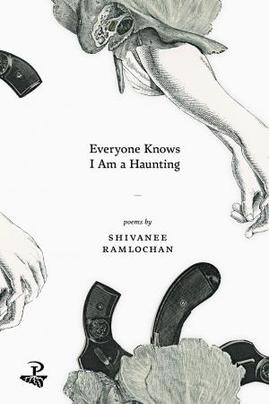Everyone Knows I Am a Haunting by Shivanee Ramlochan

Paperback: 72 pgs
Publisher: Peepal Tree Press (2017)
Purchase: @ Peepal Tree Press
Review by Len Lawson.
In her debut collection Everyone Knows I Am a Haunting, Trinidadian poet Shivanee Ramlochan exhibits just that: poems that haunt the psyche well beyond closing the book. She permeates themes of womanhood, heritage, and family with a tragic motif of sexual abuse. However, Ramlochan refuses to allow the debilitating effects of rape to stifle the voice in her poems. She acknowledges that the aftermath of rape can be omnipresent, yet she harnesses those effects to empower her words with visceral imagery that commands the page. Ramlochan manages the ghosts of the past with the ability of a literary medium as a gateway to extraordinary contemporary language.
In the first section, Ramlochan establishes a feminine heritage that shapes the narrative of abuse. In “The Abortionist’s Daughter Declares Her Love”, she introduces a grandmother who has experienced a troubled life. She discusses the plight of women through this woman’s voice and builds on her genetic ability to withstand hardship from men needed to endure the haunting abuse of rape shown in subsequent poems. The grandmother declares, “Never give a woman more sadness than she needs...she will wrangle greater things than men can fathom.” The grandmother also asserts that women “are taught to deserve nothing more than an acreage of sorrow”. Ramlochan reveals a legacy of subservience for women that has crept into the modern psyche. The occupation of an abortionist further denotes the stripping away of anything besides pain to pass on to future generations. In “The Abortionist’s Daughter Gives Cold Comfort”, the speaker can only prepare an abortion patient for more pain. “Careful./Your tears will thin these good stitches”, and settles her with a more tragic story of another woman than the patient’s own suffering.
In “My Sister of the Coral Mouth”, we see the “haunting” at work in other parts of the family through a woman who has been raped and aborted a child, yet the haunting is directed toward the abuser as a form of empowerment. “You hollow him with the ghosts you’ve made./The haunting/steals chunks of his liver; the grief grinds him shorter/in each dry season’s dust.” Therefore, haunting cannot be considered a weakness but a source of strength to show dominance over the oppressor.
The title itself comes from a line in the poem “Duenne Lara”. In Caribbean folklore, duennes are unbaptized babies or children who have died. This is one of three duenne poems in the collection. The speaker tells this particular child she is a haunting because she refuses to forget the child or leave it alone after its death. Here the haunting signifies affection and nurturing. It is not a stigma or curse.
Shivanee Ramlochan seeks in these poems to reclaim the narrative of sexual abuse for generations of women while giving readers a dose of Caribbean culture. These poems also reclaim the connotation of the word haunting as a source of power and nurturing for victims of abuse. For Ramlochan, there is no weakness in the word or these poems. They establish her as a powerhouse Trinidadian poet with a bright legacy of her own to come.

Shivanee Ramlochan is a Trinidadian poet, arts reporter and book blogger. She is the Book Reviews Editor for Caribbean Beat Magazine. Shivanee also writes about books for the NGC Bocas Lit Fest, the Anglophone Caribbean's largest literary festival, as well as Paper Based Bookshop, Trinidad and Tobago's oldest independent Caribbean specialty bookseller. She is the deputy editor of The Caribbean Review of Books. shivaneeramlochan.com
